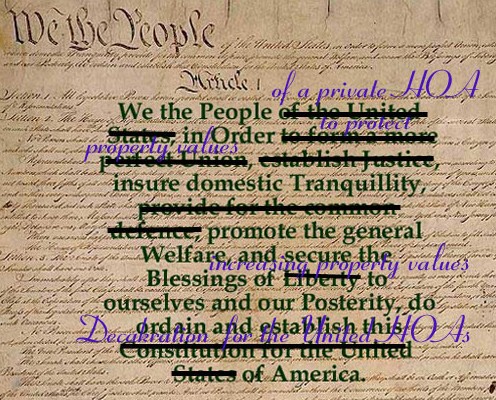I had sought for a representative example of emails to the legislators and copies of proposed testimony before the hearing committees that I would review and add constitutionality challenges. Having received none from the advocacy group, I found the following event an excellent case to demonstrate the need to apply constitutional law.

A 2023 NC bill taking strong stand on HOA foreclosure rights. It was a bill containing above and beyond restrictions and actions on filing liens for failures to pay assessment. It was read and sent to the rules committee in March without being assigned to any hearing committee, as is SOP. As I explained in “Understanding the Legislative structure,” the Rules Committee is controlled by the majority party leaders and can hold a bill from being heard, which it appears has happened.
My review and analysis rests solely on the following. The bill had good intentions but lacked any real support or concern from the bill sponsor. It simply deleted all references in the NC General Statutes granting the HOA rights to foreclose on” dead beats.” I am not aware of any social media or news media coverage of this important bill.
In general, my recommendations on preparing and supporting favorable legislation are presented in Legislative proposals and legal memoranda, but here I apply those recommendations to this bill.
First, in a highly controversial bill as we have here, the sponsor should have included an Intent section that provides the rationale for the need for the bill to be made law. Even if not passed, the Intent section becomes part of the legislative record otherwise silence reigns.* A host of legal authority failed to be presented to the NC General Assembly that, among other violations, raised constitutional issues of violations of the 8th Amendment against cruel and unusual punishment.
Of particular authority – persuasive authority in the courts – that carries strong weight is found in the Minnesota decision: Supreme Court finds taking excess foreclosure funds unconstitutional.
“She brought ‘claims under the Takings Clause of the Fifth Amendment and the Excessive Fines Clause of the Eighth Amendment.’ . . . Because we find that Tyler has plausibly alleged a taking under the Fifth Amendment [eminent domain] . . . we need not decide whether she has also alleged an excessive fine under the Eighth Amendment.”
For a discussion of foreclosure injustice, see HOA Common Sense, No. 8: Draconian punishment and intimidation. Also see the 2019 SC bill analysis, Substantive SC HOA reform bill – end foreclosure.
“The Eighth Amendment’s Excessive Fines Clause is an incorporated protection applicable to the States under the Fourteenth Amendment’s Due Process Clause. . . . The Fourteenth Amendment’s Due Process Clause incorporates and renders applicable to the States Bill of Rights protections “fundamental to our scheme of ordered liberty.”
Now is the time for all good advocates . . .
The NC legislature is still in session and bills are carried over to the following year in NC’s biannual sessions. With a strong outcry from NC citizens and advocates the Rules Committee can place this bill back into play by assigning a hearing committee and allowing for a vote; if not too late this session then next year. (See Understanding the Legislative structure). Support by the Sponsor, Senator Kandie Smith, is a strong endorsement.
The ball is in the NC advocate’s court.


